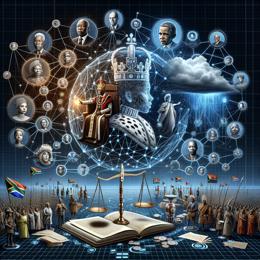Created by Bailey our AI-Agent
Mandela’s Legacy for Sale: Daughters Protest Auction of His Personal Effects
In what has become a subject of heated debate and familial discord, a selection of personal items belonging to South Africa's revered former President, Nelson Mandela, are set to go under the hammer at an auction in New York. The assemblage, primed for bidding at Guernsey’s Auction House, includes not only Mandela's 1993 original ID book, aviator sunglasses, and reading glasses but also his iconic "Madiba" shirts, a symbol synonymous with his warm, statesmanlike presence.
Mandela's daughters have been outspoken in their condemnation of the auction, advocating that such personal and symbolically significant items should remain in the country of their origin, South Africa. The outcry has highlighted a contentious issue that entangles familial rights, national heritage, and the worldwide legacy of a global icon.
The auction inventory extends to various other objects linked to Mandela's remarkable life story: his walking sticks, briefcases, a silver goose tea set that might have been a centerpiece in private gatherings, his Robben Island tennis racket – a poignant reminder of the years of incarceration he endured, and even his hearing aids, a deeply personal vestige of his later years.
But the auction is not without a purpose beyond the commercial. According to announcements, the proceeds are earmarked for financing a memorial garden dedicated to Mandela's memory, a notion that finds a bitter taste in the mouths of those opposed, who consider it a paltry consolation.
It was last month when Mandela's eldest daughter, Dr. Makaziwe Mandela, emerged victorious in a court judgment against South African authorities who had sought to prevent the sale. The South African Heritage Resources Agency (SAHRA), the Department of Sport, Arts and Culture, and the Robben Island Museum collectively raised concerns over the dispersal of the items, calling them heritage objects that convey extraordinary cultural value.
The issue transcends simple legal affairs, as Josina Z. Machel, Mandela’s stepdaughter, underlined in a poignant social media statement. "It is incredulous to witness the devaluation of a father, a grandfather, an African and world leader," Machel declared, adding emotional gravitas to the controversy. The act of preserving history and heritage within its own context versus placing a price tag on them forms the crux of Machel's and others' opposition.
At the core of this unfolding story is a complex confrontation involving national pride, heritage preservation, and the delicate balance to be struck between public remembrance and private ownership. As the daughters of one of the world’s most celebrated heroes stand firm in their resistance, the global community watches, contemplating the tenets of preservation against the pervasive culture of commerce.
The notion that ancestral relics may yet again end up in far-removed locales, necessitating pilgrimages to European museums to connect with African history, positions this auction as a focal point of a broader, enduring dialogue around colonial patterns of acquisition and the contemporary callbacks to those practices.
With the auction date set, the tug-of-war over Mandela’s personal effects continues, intermixing legal, ethical, and cultural dynamics in a tussle that likely won't be settled quietly, especially as global attention turns to the ethical implications of this sale.










